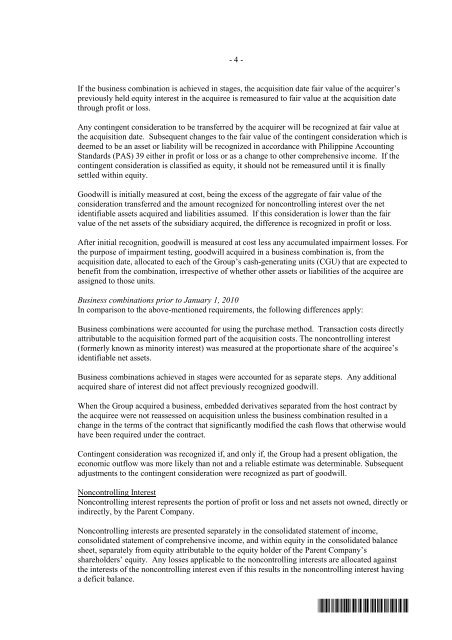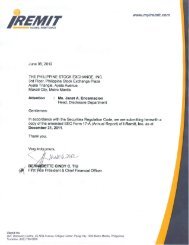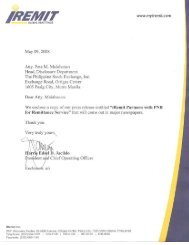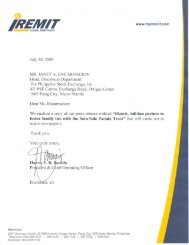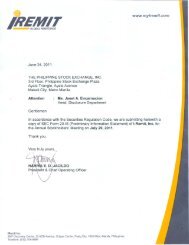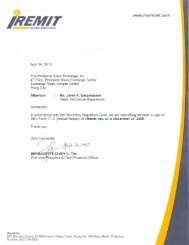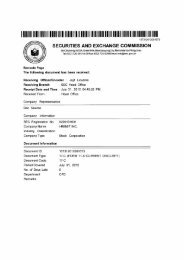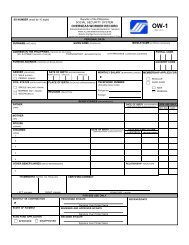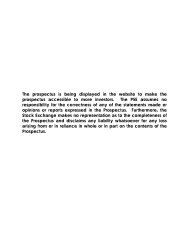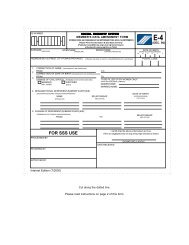SEC Form 20-IS - iRemit Global Remittance
SEC Form 20-IS - iRemit Global Remittance
SEC Form 20-IS - iRemit Global Remittance
Create successful ePaper yourself
Turn your PDF publications into a flip-book with our unique Google optimized e-Paper software.
- 4 -<br />
If the business combination is achieved in stages, the acquisition date fair value of the acquirer’s<br />
previously held equity interest in the acquiree is remeasured to fair value at the acquisition date<br />
through profit or loss.<br />
Any contingent consideration to be transferred by the acquirer will be recognized at fair value at<br />
the acquisition date. Subsequent changes to the fair value of the contingent consideration which is<br />
deemed to be an asset or liability will be recognized in accordance with Philippine Accounting<br />
Standards (PAS) 39 either in profit or loss or as a change to other comprehensive income. If the<br />
contingent consideration is classified as equity, it should not be remeasured until it is finally<br />
settled within equity.<br />
Goodwill is initially measured at cost, being the excess of the aggregate of fair value of the<br />
consideration transferred and the amount recognized for noncontrolling interest over the net<br />
identifiable assets acquired and liabilities assumed. If this consideration is lower than the fair<br />
value of the net assets of the subsidiary acquired, the difference is recognized in profit or loss.<br />
After initial recognition, goodwill is measured at cost less any accumulated impairment losses. For<br />
the purpose of impairment testing, goodwill acquired in a business combination is, from the<br />
acquisition date, allocated to each of the Group’s cash-generating units (CGU) that are expected to<br />
benefit from the combination, irrespective of whether other assets or liabilities of the acquiree are<br />
assigned to those units.<br />
Business combinations prior to January 1, <strong>20</strong>10<br />
In comparison to the above-mentioned requirements, the following differences apply:<br />
Business combinations were accounted for using the purchase method. Transaction costs directly<br />
attributable to the acquisition formed part of the acquisition costs. The noncontrolling interest<br />
(formerly known as minority interest) was measured at the proportionate share of the acquiree’s<br />
identifiable net assets.<br />
Business combinations achieved in stages were accounted for as separate steps. Any additional<br />
acquired share of interest did not affect previously recognized goodwill.<br />
When the Group acquired a business, embedded derivatives separated from the host contract by<br />
the acquiree were not reassessed on acquisition unless the business combination resulted in a<br />
change in the terms of the contract that significantly modified the cash flows that otherwise would<br />
have been required under the contract.<br />
Contingent consideration was recognized if, and only if, the Group had a present obligation, the<br />
economic outflow was more likely than not and a reliable estimate was determinable. Subsequent<br />
adjustments to the contingent consideration were recognized as part of goodwill.<br />
Noncontrolling Interest<br />
Noncontrolling interest represents the portion of profit or loss and net assets not owned, directly or<br />
indirectly, by the Parent Company.<br />
Noncontrolling interests are presented separately in the consolidated statement of income,<br />
consolidated statement of comprehensive income, and within equity in the consolidated balance<br />
sheet, separately from equity attributable to the equity holder of the Parent Company’s<br />
shareholders’ equity. Any losses applicable to the noncontrolling interests are allocated against<br />
the interests of the noncontrolling interest even if this results in the noncontrolling interest having<br />
a deficit balance.<br />
*SGVMC116502*


